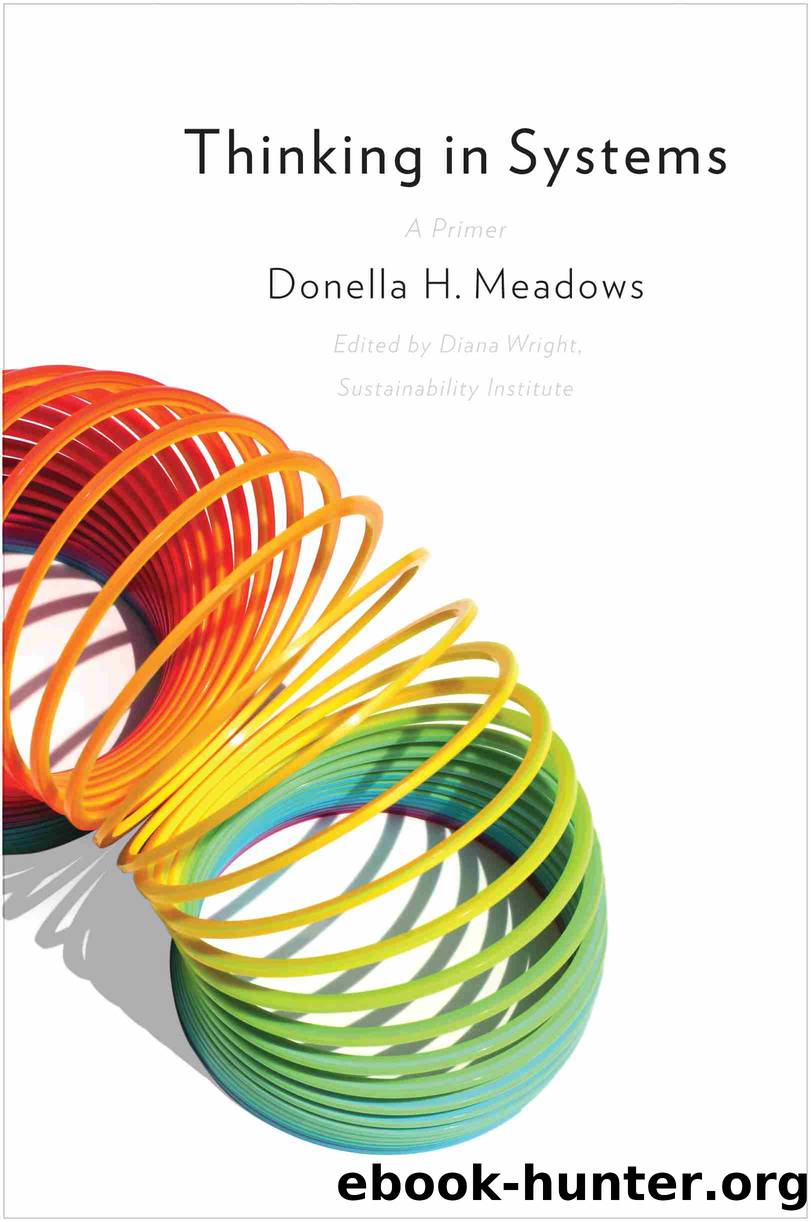Thinking in Systems by Donella Meadows

Author:Donella Meadows
Language: eng
Format: epub
Publisher: Chelsea Green Publishing
INTERLUDE ⢠Electric Meters in Dutch Houses
Near Amsterdam, there is a suburb of single-family houses all built at the same time, all alike. Well, nearly alike. For unknown reasons it happened that some of the houses were built with the electric meter down in the basement. In other houses, the electric meter was installed in the front hall.
These were the sort of electric meters that have a glass bubble with a small horizontal metal wheel inside. As the household uses more electricity, the wheel turns faster and a dial adds up the accumulated kilowatt-hours.
During the oil embargo and energy crisis of the early 1970s, the Dutch began to pay close attention to their energy use. It was discovered that some of the houses in this subdivision used one-third less electricity than the other houses. No one could explain this. All houses were charged the same price for electricity, all contained similar families.
The difference, it turned out, was in the position of the electric meter. The families with high electricity use were the ones with the meter in the basement, where people rarely saw it. The ones with low use had the meter in the front hall where people passed, the little wheel turning around, adding up the monthly electricity bill many times a day.13
Some systems are structured to function well despite bounded rationality. The right feedback gets to the right place at the right time. Under ordinary circumstances, your liver gets just the information it needs to do its job. In undisturbed ecosystems and traditional cultures, the average individual, species, or population, left to its own devices, behaves in ways that serve and stabilize the whole. These systems and others are self-regulatory. They do not cause problems. We donât have government agencies and dozens of failed policies about them.
Since Adam Smith, it has been widely believed that the free, competitive market is one of these properly structured self-regulating systems. In some ways, it is. In other ways, obvious to anyone who is willing to look, it isnât. A free market does allow producers and consumers, who have the best information about production opportunities and consumption choices, to make fairly uninhibited and locally rational decisions. But those decisions canât, by themselves, correct the overall systemâs tendency to create monopolies and undesirable side effects (externalities), to discriminate against the poor, or to overshoot its sustainable carrying capacity.
To paraphrase a common prayer: God grant us the serenity to exercise our bounded rationality freely in the systems that are structured appropriately, the courage to restructure the systems that arenât, and the wisdom to know the difference!
Download
This site does not store any files on its server. We only index and link to content provided by other sites. Please contact the content providers to delete copyright contents if any and email us, we'll remove relevant links or contents immediately.
The Complete Stick Figure Physics Tutorials by Allen Sarah(7349)
Secrets of Antigravity Propulsion: Tesla, UFOs, and Classified Aerospace Technology by Ph.D. Paul A. Laviolette(5356)
Thing Explainer by Randall Munroe(3921)
The River of Consciousness by Oliver Sacks(3586)
The Order of Time by Carlo Rovelli(3172)
How To by Randall Munroe(3091)
A Brief History of Time by Stephen Hawking(3006)
I Live in the Future & Here's How It Works by Nick Bilton(2972)
What If?: Serious Scientific Answers to Absurd Hypothetical Questions by Randall Munroe(2686)
The Great Unknown by Marcus du Sautoy(2675)
Midnight in Chernobyl by Adam Higginbotham(2526)
Blockchain: Ultimate Step By Step Guide To Understanding Blockchain Technology, Bitcoin Creation, and the future of Money (Novice to Expert) by Keizer Söze(2471)
Networks: An Introduction by Newman Mark(2389)
The Meaning of it All by Richard Feynman(2333)
Easy Electronics by Charles Platt(2316)
The Tao of Physics by Fritjof Capra(2255)
Midnight in Chernobyl: The Untold Story of the World's Greatest Nuclear Disaster by Adam Higginbotham(2206)
Introducing Relativity by Bruce Bassett(2106)
When by Daniel H Pink(2102)
